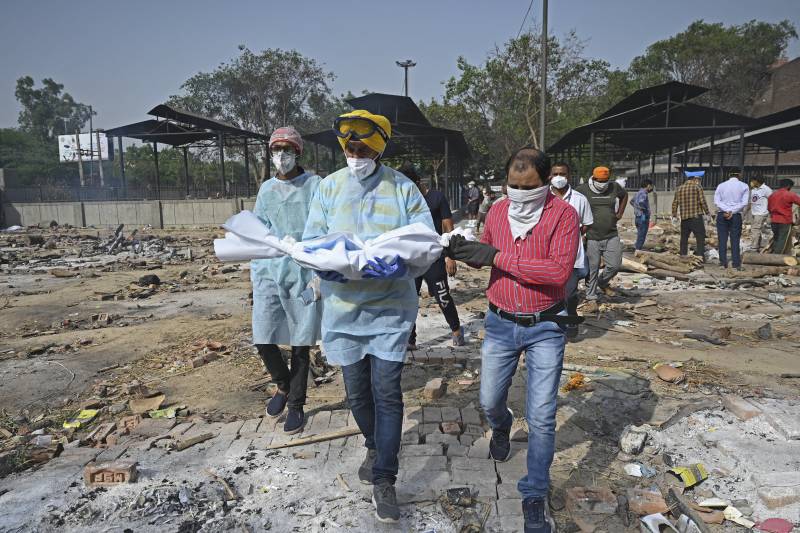India's interfaith volunteers help farewell Covid victims

Stay tuned with 24 News HD Android App

Suneet Sharma has calmly staged dozens of funerals each day of India's resurgent coronavirus crisis -- but he was overwhelmed when a father arrived at the crematorium with the body of his infant daughter.
The 48-year-old volunteers in New Delhi with a Sikh association, one of many groups to spring up around the country and reach across religious traditions to help bereaved families bid farewell to their loved ones.
The arrival of bodies at cremation and burial grounds has been unrelenting in recent weeks and teams work long hours under the summer heat, sometimes in full protective gear to reduce their exposure to the virus.
See Also: Pandemic to be 'far more deadly' this year, WHO warns
Like Sharma, the volunteers from different faiths are willing to take on the emotional and physical toll of carrying out the final rites, driven by a sense of duty.
"We are doing it for... mankind, for humanity. That's all. Sometimes it's very, very painful," the 48-year-old told AFP.
Behind him, smoke curled up from crackling funeral pyres and family members of victims stood silently in protective suits.
"We are used to cremating 50 bodies a day, but we never cry. Today, I saw a little girl. Today, we cried," he said.
- 'Of course I'm scared' -
Sharma sleeps in his car at night and has not seen his family for two months, fearful that he could spread the virus to them.
Syed Ibrahim, a volunteer with a Muslim charity group in the southeastern city of Chennai, is also aware of the risks.
"Of course I'm scared. This is an extremely contagious disease," he told AFP.
"In our religion, it's said that God has destined certain things for us... so we bravely take care of the burials and anything else people need from us."
See Also: Indian variant may delay UK lockdown easing: PM
The skyrocketing cost of ambulances has meanwhile led the "Mercy Angels" -- a group of Christian, Hindu and Muslim volunteers in Bangalore -- to help poor families transport bodies to cemeteries and crematoriums.
They prepare graves and offer final prayers according to the religious customs of the dead.
"We serve... everybody, be (they) a Hindu, Muslim or Christian," driver Mohammed Sadiq told AFP.
- Orphaned bodies -
Fear of the virus in the world's second most infected nation -- which has recorded more than 262,000 deaths so far, although experts say the actual toll is much higher -- has also seen some families shun funerals.
Mahdi Raza, 30, who usually runs a cafe in the northern city of Lucknow and had been fasting during Ramadan, has buried hundreds of Covid-19 victims since the start of the pandemic last year.
But in the past few months, he has also received calls for help from non-Muslim communities.
"A body was... lying for eight hours inside a house as family members and neighbours refused to cremate it. Someone finally managed to contact us and we picked up the body and handed it over to the crematorium," he told AFP.
Back in Delhi, Sharma is hopeful the crisis might be easing in his city.
On the day AFP visited the crematorium, the number of funerals had fallen from the peak of up to 120 bodies a day in late April to between 50 and 80 a day.
"We only had 25 bodies so far today. So we are relieved," he said.
First flight lands in Australia from India
A plane carrying more than 70 Australians fleeing virus-stricken India landed in the country's north Saturday, the first since a controversial ban on arrivals ended.
The plane touched down in Darwin on Saturday morning after picking up vulnerable passengers from New Delhi, but 72 of its booked passengers were barred from flying after 48 tested positive for Covid-19 and others were deemed close contacts.
Initially planned to carry 150 travellers, just over half of those booked were cleared to board the plane, a Northern Territory Health spokeswoman said.
Under the arrangement, those who test positive for the virus, or were deemed close contacts, have to remain in India until they return a negative test.
The arrivals will quarantine at Outback quarantine facility Howard Springs for at least a fortnight.
Earlier this month, the government threatened to jail anyone, including Australian citizens, who breached the travel ban, which expired at midnight on Friday.
Around 9,000 Australians are believed to be in India, where hundreds of thousands of new coronavirus cases are being detected every day, and the death toll is soaring.
Since March 2020, Australians have been barred from travelling overseas, and an individual exemption is needed for foreign visitors to enter the country.
Australia has no widespread community transmission of Covid-19, but has seen several outbreaks emerge from hotel quarantine facilities, causing disruptive city lockdowns.
